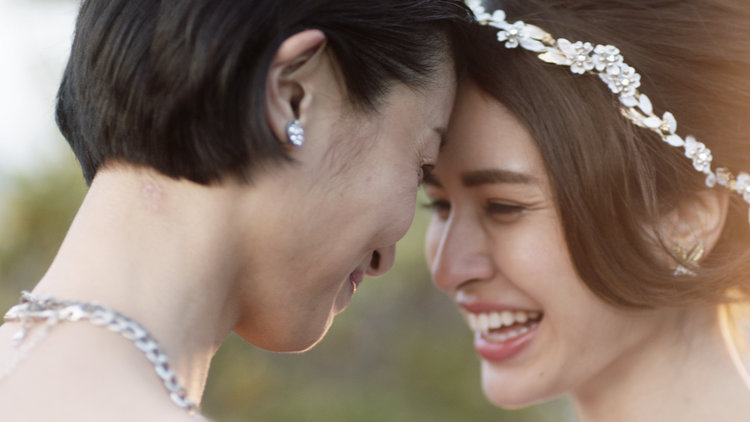By Andrew Hamlin
NORTHWEST ASIAN WEEKLY

Photo from Darren Culture & Creativity, Haze Films
Taiwanese director Guang-cheng Shie shot several short films, sometimes as a director, sometimes as a producer, writer or sound recordist. With his debut feature film “Bao Bao,” he brings us the sprawling story of a baby, four parents, and the strife, with heartbreak, it took to produce a single tiny human being.
The film opens with Cindy (played by Emmie Rays) on a train, alone. We aren’t sure where she is, where she’s going, or why she’s taking this trip. As the film progresses, we gradually learn answers to these questions. But director Shie, working from a script by I.-Han Teng, stages the action in a series of flashbacks, returning every now and then to the present. The approach can become confusing at first, but over time, the story and the film’s distinct rhythms become clear.
Cindy and her wife Joanne (Huan-Ru Ke) come from Taipei, but they live in London, largely because the much-older Joanne commands a prestigious job there. Life is good, with Joanne’s money and the lugubrious London nightlife to spend it on.
But the couple wants a child. Enter a pair of Asian gay men, Charles and Tim (Yukihiko Kageyama and Li-Yun Tsai), also making their way in London. The two couples become friends, and the women propose using the men’s sperm to make a child all four of them can share.
The plan seems simple enough. The men will furnish sperm, and Cindy will bear the child (it’s tacitly understood that Joanne’s past the age where she could safely carry to term). But all too quickly, issues of who will raise the offspring, who will have primary custody of the child, and who will get to see the child the most, rear up.

Photo from Darren Culture & Creativity, Haze Films
One underlying instability through the whole movie lies in the lesbian couple’s interplay.
Joanne’s tough and confident at business, and the leather jacket she wears outside the office symbolizes her self-image as fundamentally tough. She’s accustomed to giving orders and having them obeyed without question. Time after time, she lays down the law to Cindy, and Cindy nods her head and goes along with the plan.
But Joanne doesn’t stop to think about what Cindy’s thinking and feeling under the surface. And all too soon, the consequences of this set in.
The gay men also demonstrate disparities in their personalities, but have less trouble staying on the same page. One of them will act up and act goofy, while the other one grins and shakes his head. They sometimes annoy each other, and the women, in this fashion, but they have an easier time relating to one another. Forces outside the relationship itself, intrude on them. Shame, and family expectations.
The story moves back and forth between London and Taipei as it moves back and forth in time, to the point where we don’t know, sometimes, where a scene is set until someone speaks, or a landmark comes into view. This reinforces the feeling of being lost, that Cindy experiences when she finally decides to sit up and think for herself.
The story finds its resolution, after a great deal of heart-to-heart talk, and some heartbreak.
The story’s tendencies toward unlikely extremes, to force its talking points, sometimes seem awkward. When the characters just talk, though, whether hiding from conflict or newly determined to resolve conflict at any cost, it’ll remind you (like it or not) of talks you’ve had as you’ve made your own way.
“Bao Bao” shows on Sunday, Oct. 14, at 2:15 p.m., at the SIFF Cinema Egyptian, 805 East Pine Street, as a presentation of TWIST: The Seattle Queer Film Festival. For prices and additional information, visit threedollarbillcinema.org.
Andrew can be reached at info@nwasianweekly.com.



